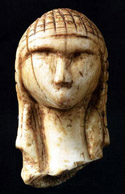Anthropology, Department of

Department of Anthropology: Faculty Publications
Why Should Fathers Father?
Document Type Article
Published in MEN IN FAMILIES: When Do They Get Involved? What Difference Does It Make?, edited by Alan Booth and Ann C. Crouter LAWRENCE ERLBAUM ASSOCIATES, PUBLISHERS, 1998, Mahwah, New Jersey & London. Used by permission.
Abstract
The findings about the ways in which components of men's human capital is translated into human capital of offspring are intriguing both for what the findings show about secular trends in fertility, consequences for child accomplishment, and for what they show about the importance of the child's mother in linking the father to the child. It is this issue, the mother as link to child and the nature of the father's relationships with the mother that I make the center of my remarks.
There are several things to keep in mind when we try to grasp the evolutionary big picture and to make sense of men in human families as we now find them in postindustrial western society. We humans of today carry with us the effects of selection in past environments. These effects are evident in our physical and behavioral makeup. Although we cannot know in detail the past physical and social environments in which our ancestors evolved, we can make various informed guesses, based on an understanding of how morphological, behavioral, and life-history features act together in other species. The ethnographic and historical literature provide data of another type, allowing us to see men playing various domestic and paternal roles. In these different settings, however, the concrete form of social institutions can vary so widely that a unitary picture of men in families does not emerge. There are certain regularities of human experience that are worth reviewing for the purpose of thinking about men in families in modern western society.
There is every reason to assume that humans will continue to mate and bear children, however the institutional context within which mating and family formation occur has changed dramatically in recent decades. In former times in our own history, and at present in parts of the economically undeveloped world, men have received tangible rewards as a result of making formal marriages with women and fathering children. Their status is enhanced by assuming the role of head of household and the servile nature of women's status ensures them of an unpaid domestic labor force. Children's labor has economic value in agrarian and pre-industrial times. In societies with weak central governments, men can raise the status of their own kinship groups by increasing the number of children through births to multiple wives and by rising to political prominence as elders. Now the orthodox or classic returns to men for marrying, fathering, and supporting children have essentially disappeared. Children are costly to raise, local kinship groups are no longer useful in the political ambitions of men, and polygynous unions are increasingly outlawed.
Many questions can be raised about the future of men in families. In this postmodern era of information based economy, consumer services, and diminishing manufacturing jobs for skilled and unskilled workers, the research reported in this volume indicates that contributions by fathers incontrovertibly lead to enhanced performance and improved lives for children. Yet, as indicated earlier, the returns to men of investing time and energy in the support of children are not apparent to all. It may be that there is something to be gained by framing research questions around such questions as, "Why should fathers father?" and "How can the returns on fathering be advocated or enhanced in order for men to perceive the advantage to increased frequency and quality of fathering?" Mothering, by and large, can be taken for granted, for reasons explored earlier, although here too, "good" mothering is not inevitable. Fathering is highly variable and problematic.

